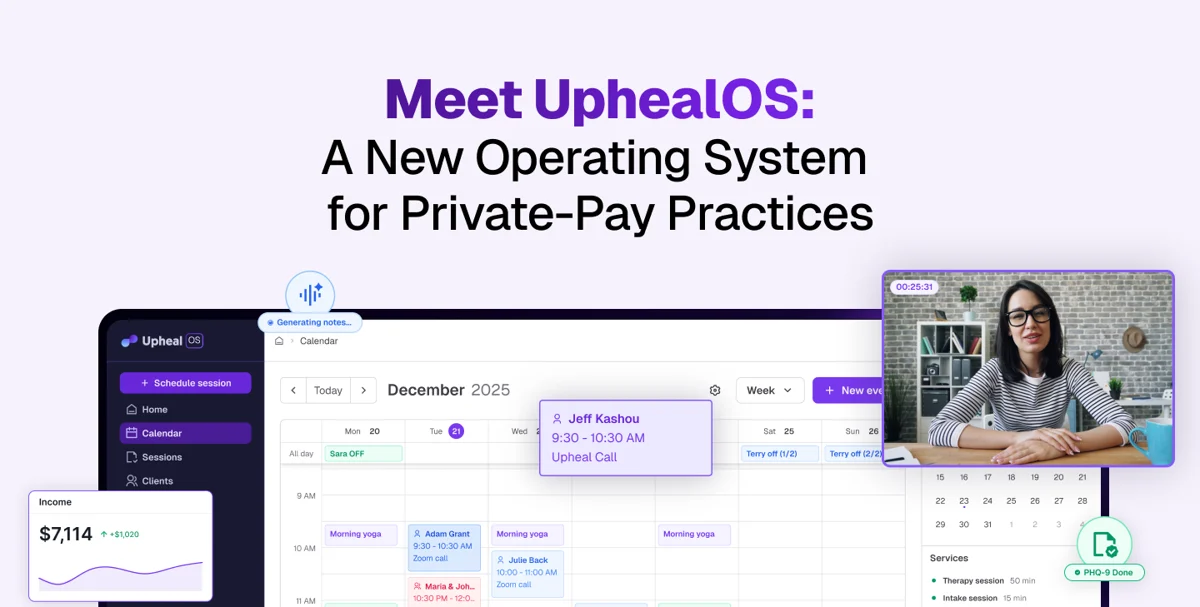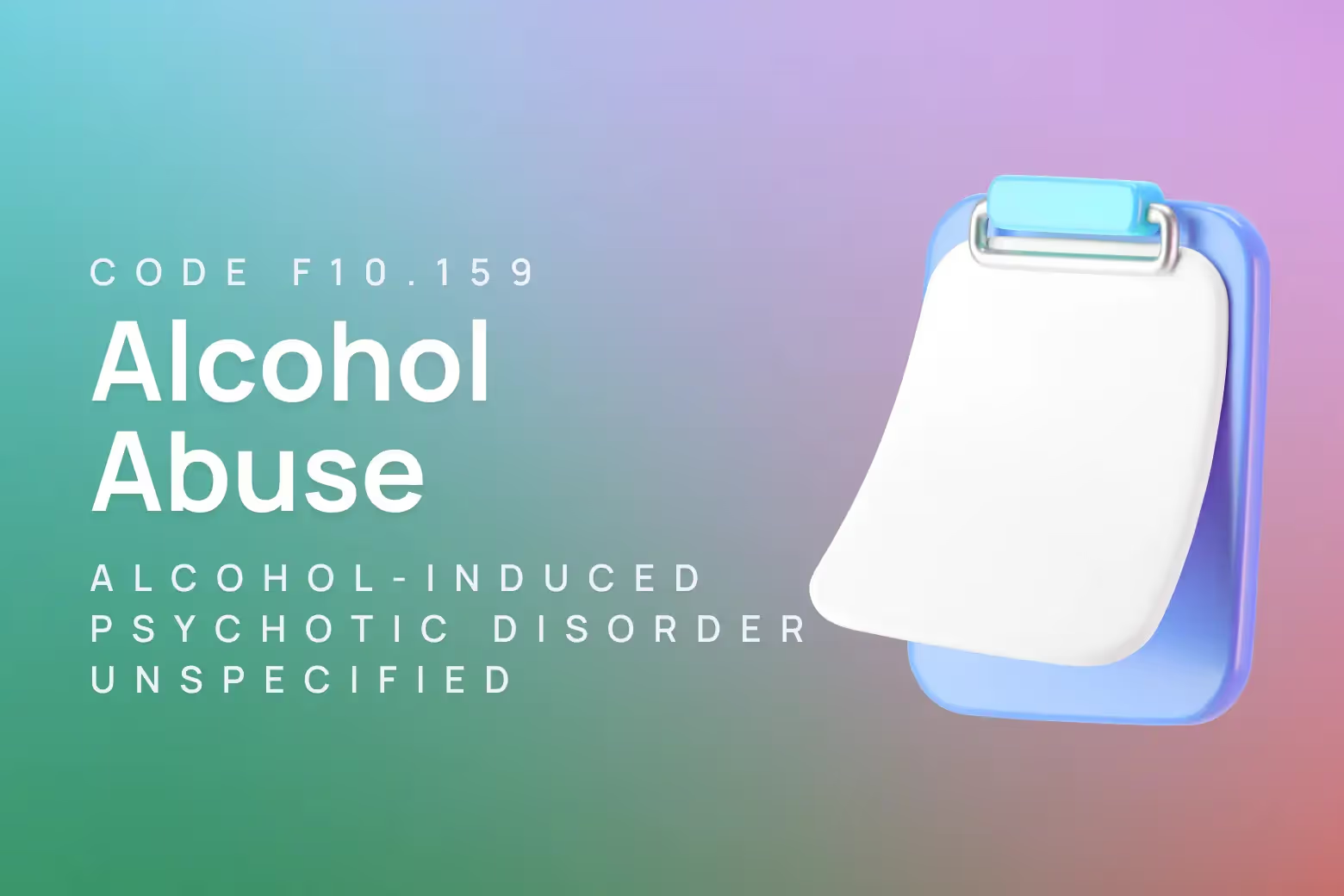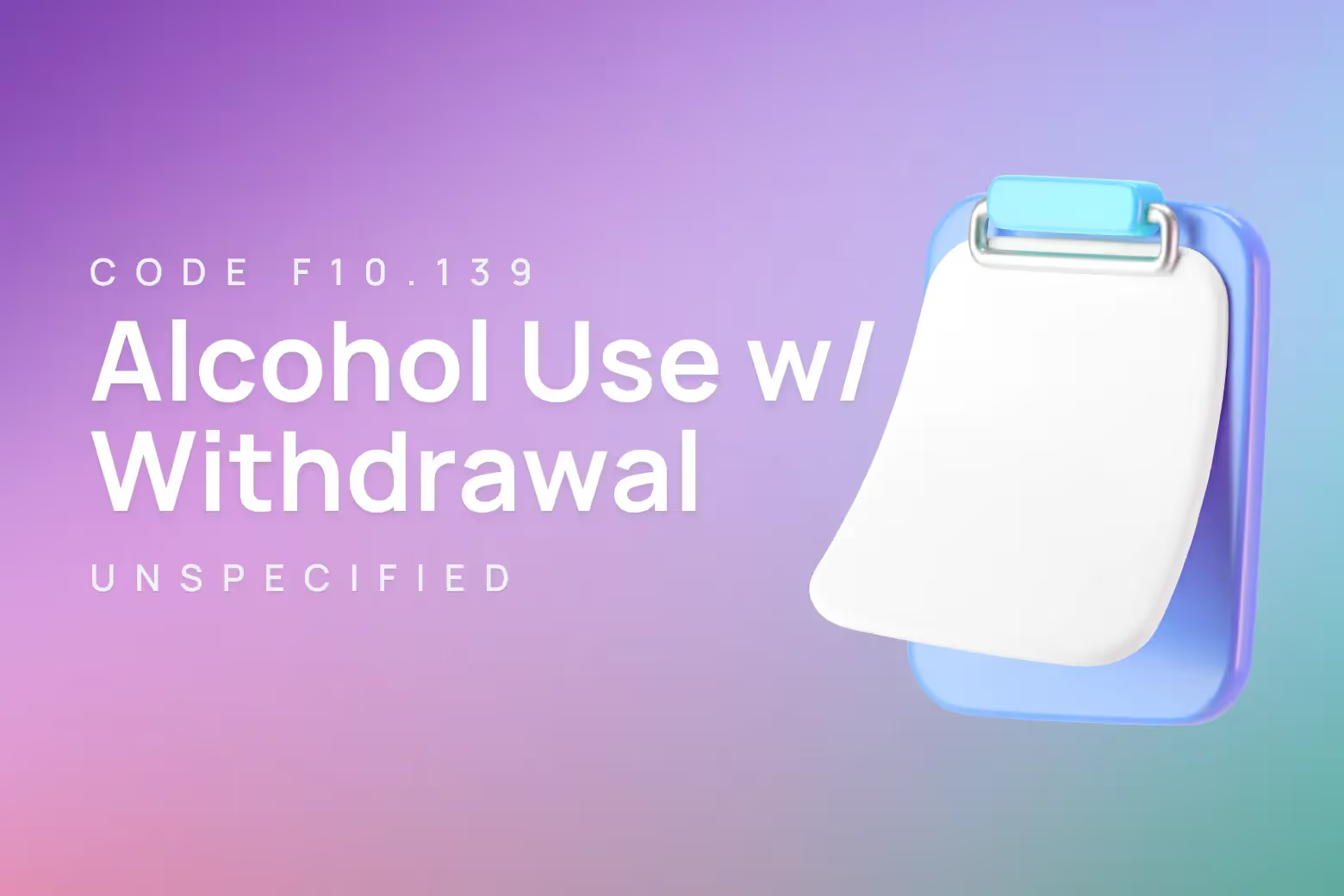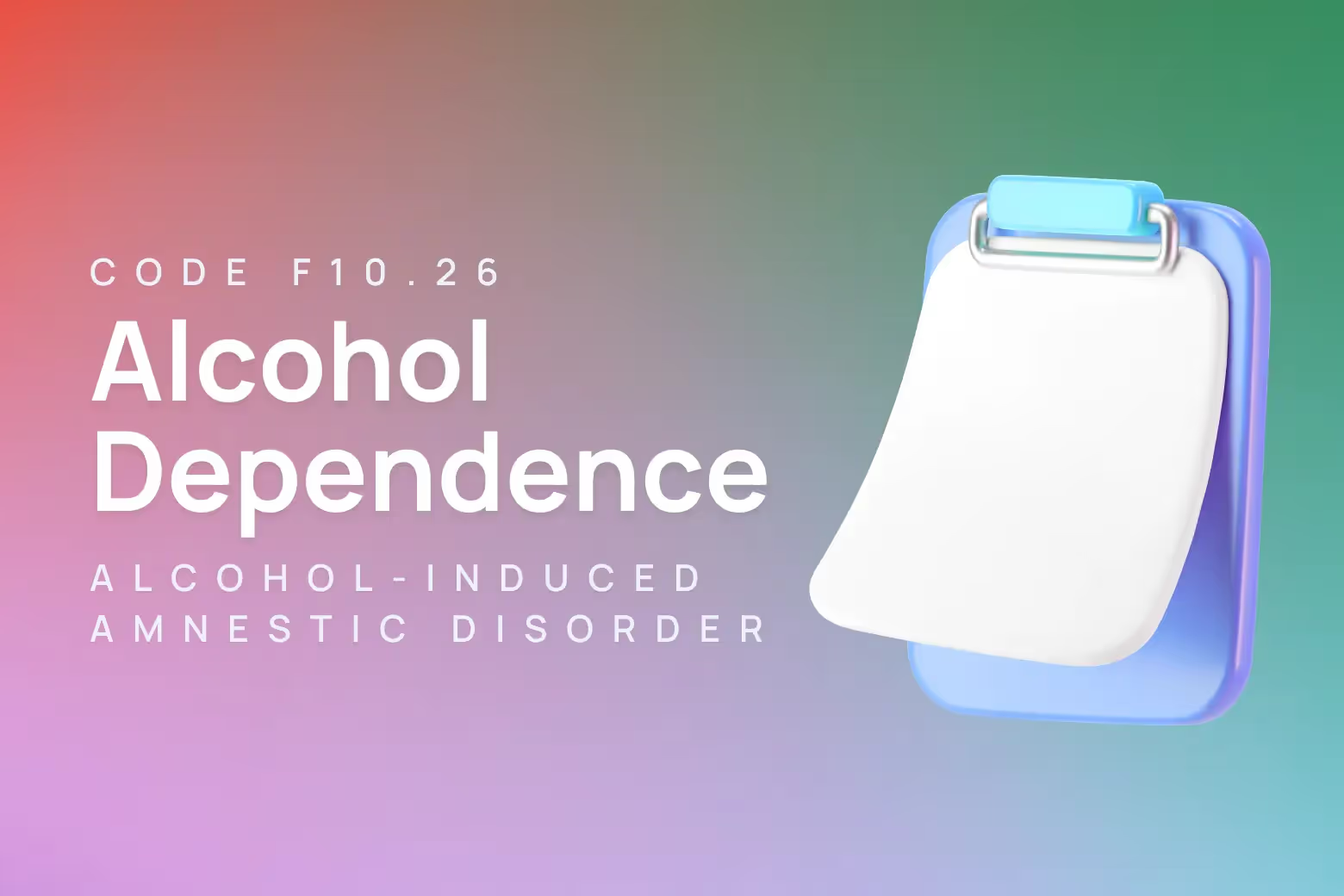ICD-10 code for alcohol abuse with alcohol-induced psychotic disorder, with delusions
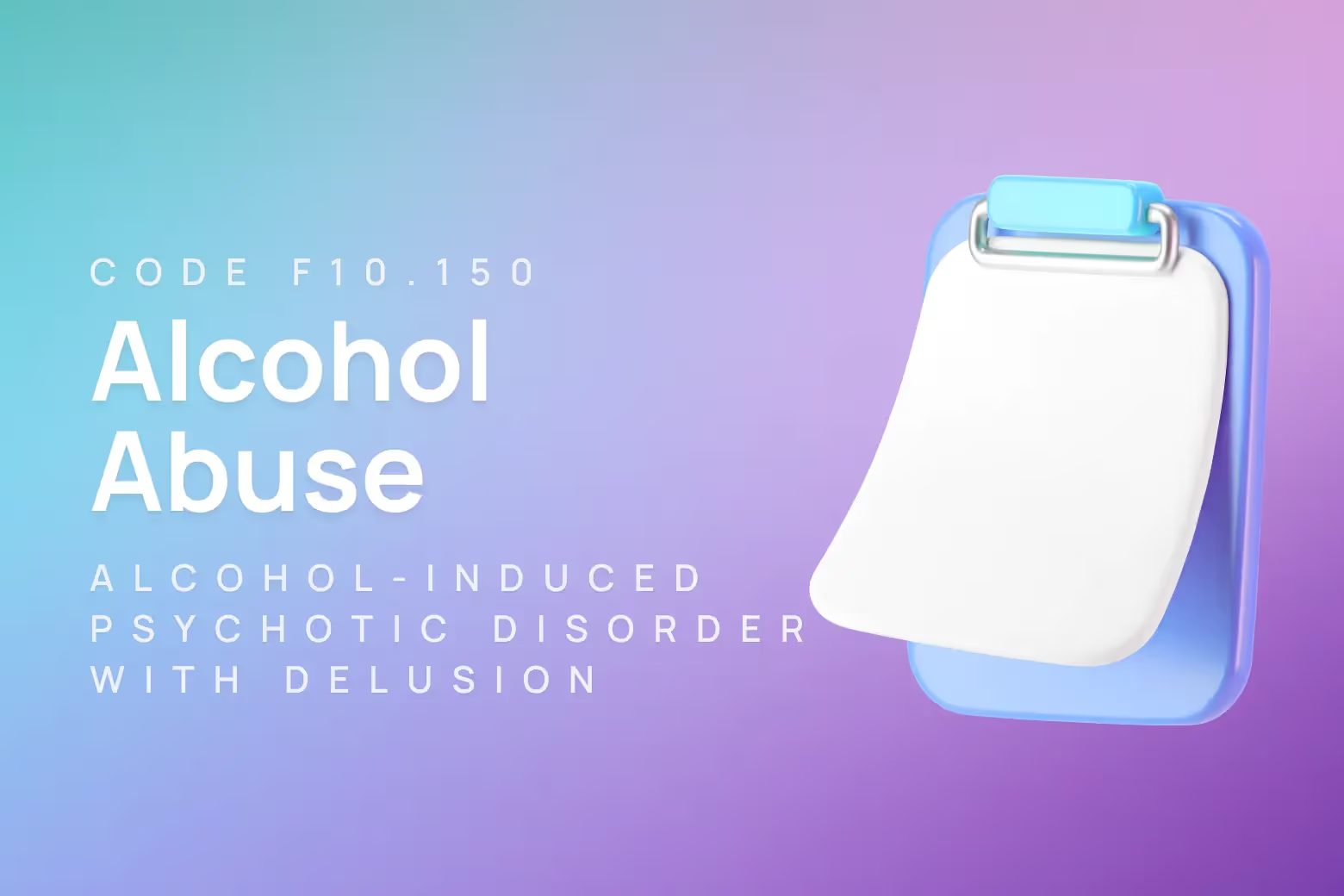
F10.150 is the ICD-10 code for alcohol abuse with alcohol-induced psychotic disorder, with delusions.
This diagnosis applies when individuals with a pattern of problematic alcohol use develop fixed false beliefs that occur during alcohol intoxication or withdrawal.
Accurate diagnosis ensures clients receive appropriate treatment while meeting compliance standards for continued care authorization.
Key features:
- F10.150 ICD-10 code requires established alcohol abuse pattern with significant impairment or distress
- Delusions must be directly related to alcohol use or withdrawal
- Symptoms occur during intoxication, withdrawal, or persist afterward
- Differs from alcohol-induced psychotic disorder with hallucinations

Diagnostic criteria for alcohol abuse with alcohol-induced psychotic disorder, with delusions (F10.150)
The F10.150 diagnosis requires meeting criteria for both alcohol abuse and alcohol-induced psychotic disorder with prominent delusional features.
Alcohol abuse involves a problematic pattern of alcohol consumption leading to clinically significant impairment or distress manifested by at least two symptoms within a twelve-month period.
These symptoms include
- craving or strong urges to use alcohol
- persistent unsuccessful efforts to control use
- consuming alcohol in larger amounts than intended
- recurrent use resulting in failure to fulfill major obligations
- continued use despite persistent social or interpersonal problems
- giving up important activities because of alcohol
- using alcohol in physically hazardous situations
- tolerance
- withdrawal symptoms
The psychotic component specifically involves delusions that develop during alcohol intoxication or withdrawal and are judged to be directly related to the physiological effects of alcohol.
These delusions often present as persecutory beliefs while individuals maintain a clear sensorium, distinguishing this condition from alcohol withdrawal delirium.
When to use F10.150 diagnosis code
F10.150 should be applied when clients present with both alcohol abuse patterns and alcohol-induced delusional symptoms.
Clinicians must carefully differentiate this diagnosis from related conditions to ensure proper coding compliance.
F10.150 vs F10.151 (Alcohol abuse with alcohol-induced psychotic disorder, with hallucinations)
The primary distinction between these codes lies in the predominant psychotic symptoms present.
F10.150 applies when delusions are the main psychotic feature, while F10.151 is used when hallucinations dominate the clinical picture.
Clients with F10.150 experience fixed false beliefs such as persecutory thoughts about others trying to harm them, ideas of reference, or grandiose delusions.
In contrast, those coded F10.151 primarily experience perceptual disturbances including auditory voices, visual images, or tactile sensations that aren't actually present.
While some overlap can occur, the code selection depends on which symptom type is most prominent and clinically significant.
F10.150 vs F10.159 (Alcohol abuse with alcohol-induced psychotic disorder, unspecified)
F10.159 serves as the catch-all code when alcohol-induced psychotic symptoms are present but don't clearly fit the specific patterns for delusions or hallucinations.
This might apply when clients present with mixed psychotic features, when symptoms are too transient to categorize definitively, or when insufficient information exists to specify the exact nature of psychotic symptoms.
F10.150 requires clear documentation of delusional content and should only be used when fixed false beliefs represent the predominant psychotic manifestation.
The unspecified code provides flexibility for atypical presentations that don't meet specific criteria.
F10.150 vs F06.2 (Psychotic disorder due to known physiological condition)
While both involve substance-related psychotic symptoms, F06.2 applies to psychotic disorders caused by direct physiological effects of medical conditions rather than substance use.
F10.150 specifically requires that delusions result from alcohol's effects on brain functioning.
Additionally, F06.2 might be considered when psychotic symptoms persist long after alcohol cessation, suggesting underlying medical causes rather than direct alcohol-induced effects.
The temporal relationship between alcohol use and symptom onset helps distinguish these diagnoses.
Related ICD-10 codes
- F10.15 - Alcohol abuse with alcohol-induced psychotic disorder
- F10.151 - Alcohol abuse with alcohol-induced psychotic disorder, with hallucinations
- F10.159 - Alcohol abuse with alcohol-induced psychotic disorder, unspecified
Interventions and CPT codes for alcohol abuse with alcohol-induced psychotic disorder, with delusions
Initial psychiatric evaluation
Comprehensive assessment forms the foundation of effective treatment for F10.150.
The initial evaluation establishes the alcohol use pattern, documents delusional content, assesses safety risks, and develops an integrated treatment plan addressing both substance abuse and psychotic symptoms.
This thorough diagnostic process helps differentiate alcohol-induced delusions from primary psychotic disorders and guides appropriate intervention strategies.
Clinicians should assess suicide risk carefully, as reports have highlighted increased suicide risk in alcohol-related psychotic presentations.
CPT Code: 90791 - Psychiatric diagnostic evaluation
Individual psychotherapy
Ongoing individual therapy represents the core treatment approach, combining motivational interviewing, cognitive behavioral therapy for substance use disorders, and relapse prevention strategies.
Sessions focus on building insight into the relationship between alcohol use and psychotic symptoms while developing coping strategies.
Therapy sessions address both the substance abuse component and the psychological impact of experiencing delusions.
Time-based coding allows flexibility to match session length with client needs and treatment intensity requirements.
CPT Codes:
- 90832 - Psychotherapy, 30 minutes (16-37 minutes)
- 90834 - Psychotherapy, 45 minutes (38-52 minutes)
- 90837 - Psychotherapy, 60 minutes (53+ minutes)
Family therapy interventions
Family involvement plays a crucial role in recovery by addressing codependency patterns, improving communication, and creating supportive home environments.
Family members learn to recognize warning signs of both alcohol abuse and psychotic symptoms while maintaining appropriate boundaries.
These interventions help reduce family accommodation of symptoms and build a support network that promotes sustained recovery.
Family education about the relationship between alcohol and psychotic symptoms improves long-term outcomes.
CPT Codes:
- 90846 - Family therapy without patient present
- 90847 - Family therapy with patient present
Crisis intervention services
Given the elevated suicide risk and potential for dangerous behavior during psychotic episodes, crisis intervention capabilities remain essential.
These services provide immediate safety assessment and stabilization when delusions pose risks to the client or others.
Crisis interventions may involve emergency psychiatric evaluation, safety planning, or coordination with inpatient services when outpatient management proves insufficient.
Documentation should clearly capture the crisis nature and interventions provided.
CPT Codes:
- 90839 - Psychotherapy for crisis (first 60 minutes)
- 90840 - Psychotherapy for crisis (each additional 30 minutes)
Screening and brief intervention (SBIRT)
Structured screening and brief intervention provides efficient assessment and early intervention for alcohol-related problems.
This approach works particularly well in healthcare settings where comprehensive psychotherapy may not be immediately available.
SBIRT interventions include standardized screening tools, risk assessment, brief motivational counseling, and referral coordination.
These services can identify alcohol-induced psychotic symptoms early and facilitate appropriate specialty referrals.
CPT Codes:
- 99408 - Screening and brief intervention, 15-30 minutes
- 99409 - Screening and brief intervention, greater than 30 minutes
- G0396 - Structured assessment and brief intervention, 15-30 minutes (Medicare)
- G0397 - Structured assessment and brief intervention, greater than 30 minutes (Medicare)
How Upheal improves F10.150 ICD-10 documentation
Suggesting appropriate ICD-10 codes based on session content
Upheal's clinical documentation platform analyzes session notes and client presentations to recommend accurate diagnostic codes, including the nuanced distinctions between F10.150, F10.151, and related alcohol-induced disorders.
The platform recognizes key clinical indicators such as delusional content descriptions, temporal relationships between alcohol use and symptom onset, and functional impairment patterns.
This intelligent code suggestion reduces documentation errors while ensuring clinicians capture the specific psychotic features present.
The platform helps distinguish between delusions, hallucinations, and mixed presentations that might otherwise lead to coding confusion or compliance issues.
Maintaining HIPAA-compliant records with proper diagnostic coding
The platform automatically generates comprehensive progress notes that document both substance abuse patterns and psychotic symptoms in compliance with healthcare regulations.
Notes capture essential elements including alcohol use frequency and quantity, delusional themes and intensity, safety assessments, and treatment response.
Upheal's documentation includes appropriate diagnostic justification and supports medical necessity for continued treatment.
This thorough record-keeping protects providers during audits while ensuring clients receive authorized care for their complex presentation.
Reducing administrative burden so you can focus on client care
By automating routine documentation tasks, Upheal allows clinicians to dedicate more attention to the complex therapeutic work required for clients with F10.150.
The platform handles time-consuming note generation, code selection, and compliance requirements while preserving the therapeutic relationship.
This efficiency becomes particularly valuable when managing clients with alcohol-induced psychotic disorders, who often require intensive monitoring, safety assessments, and coordinated care approaches that benefit from focused clinical attention rather than administrative distractions.
Supporting clients with alcohol abuse and alcohol-induced psychotic disorder
Recovery from alcohol-induced psychotic disorder with delusions requires integrated treatment addressing both substance abuse and mental health symptoms.
Clients often experience significant distress and functional impairment that improves markedly with appropriate intervention and sustained abstinence from alcohol.
The therapeutic relationship becomes particularly important given the potential for paranoia and mistrust associated with delusional symptoms.
Building rapport while maintaining safety awareness creates the foundation for successful treatment engagement and symptom reduction.
Research indicates that alcohol-related psychotic symptoms typically resolve with sustained abstinence, though some individuals may develop chronic presentations requiring ongoing psychiatric care.
Early intervention and comprehensive treatment planning improve long-term outcomes while reducing the risk of relapse and psychiatric complications.
Upheal's clinical documentation platform helps behavioral healthcare providers maintain focus on these complex therapeutic relationships while ensuring thorough, compliant documentation.
By streamlining administrative requirements, clinicians can dedicate their expertise to supporting clients through the challenging process of recovery from both addiction and psychotic symptoms.
Try Upheal free to experience how intelligent documentation support enhances clinical care quality.


